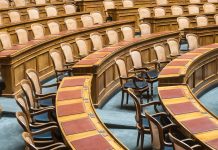Following a House Foreign Affairs committee hearing entitled “Combatting Ebola in West Africa: The International Response” with top administration officials from the U.S. Agency for International Development, U.S. Department of State and U.S. Department of Defense, U.S. Representatives David N. Cicilline (D-RI) and Karen Bass (D-CA) today introduced a congressional resolution to acknowledge and thank medical professionals and volunteers for their extraordinary courage in responding to the Ebola outbreak. The new congressional resolution expresses “the sense of Congress that health workers deserve our profound gratitude and respect for their commitments and sacrifices in addressing the Ebola epidemic in West Africa.”
Despite Ebola outbreaks historically having a case fatality rate of up to 90 percent, as of November 10, the United States Agency for International Development (USAID) has received nearly 4,800 self-nominated, non-vetted requests through the usaid.gov online registration portal for healthcare volunteers and is passing these contacts to interested aid organizations working in the region for vetting, possible selection, and training. These volunteers face dangerous and life-threatening conditions and according to United Nations health agency, over 370 health workers in West Africa, including several Americans, have already been infected in the current outbreak.
“Health workers and volunteers who are on the frontlines combatting the Ebola virus are risking their lives to treat patients and stop the spread of this terrible and deadly disease. We owe them a tremendous debt of gratitude for their bravery,” said Cicilline.
“Congress should properly commend the hundreds of healthcare workers in the United States and those working in West Africa whose bravery is not only saving lives, but they are keeping the Ebola virus from spreading further. It was embarrassing how leaders treated Maine nurse Kaci Hickox after she returned from treating Ebola victims in West Africa. These healthcare workers are heroes–putting their own lives in danger to care for and treat people who are most in need,” said Bass.
Many non-governmental organizations such as Doctors Without Borders (MSF), the International Federation of Red Cross and Red Crescent Societies, American Jewish World Service, International Medical Corps, International Rescue Committee, Partners in Health, Samaritan’s Purse, World Food Programme, and others are responding to the Ebola crisis. The United States is helping to train health workers from African Union member states to directly respond to medical needs in Guinea, Liberia, and Sierra Leone, but more trained workers are still needed.
At the time the outbreak began, many health workers in West Africa did not have proper training or experience to recognize, diagnose, and care for Ebola patients and prevent contraction. For example, in 2003 after 14 years of civil war, Liberia had only 30 doctors serving a country of 3 million people. When the outbreak began, Liberia had only 50 doctors. Experts have stated that the greatest barrier to ending the outbreak in West Africa is an insufficient number of health workers.












